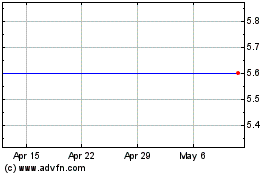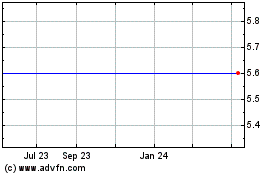With U.S. Asset Sale, Avon Joins an Exclusive Club--Update
December 17 2015 - 3:35PM
Dow Jones News
By Theo Francis
When Avon Products Inc. sells the bulk of its North American
operations, it will join a very small club: publicly traded
companies based in the U.S. but with little or no U.S.
operations.
Only a handful of other large companies have gone the same route
in recent years. Among them are Philip Morris International Inc.,
the international tobacco giant; and Coca-Cola Enterprises Inc.,
the big soft-drink bottler. And Coca-Cola Enterprises is about to
leave the club by merging with two big European counterparts.
Tax experts say the practice is rare for good reason: It isn't
very tax efficient. That is because foreign profits earned by U.S.
companies are taxed by the U.S. unless companies can credibly argue
they have been permanently reinvested abroad. Even then, bringing
the resulting cash to the U.S.--for example, to repurchase stock,
pay dividends, make acquisitions or for other purposes--triggers a
tax bill.
"They're not going to want to have a situation long-term where
they've got a U.S. parent with no U.S. operations sitting on top of
a foreign operation that appears to be very profitable," says J.
Richard Harvey, a Villanova University law professor and former
senior accountant in the U.S. Treasury Office of Tax Policy who
helped coordinate past government efforts against offshore tax
evasion. "You're going to want to do something to get that U.S.
parent out of the equation."
Philip Morris International, for example, has maintained its New
York headquarters since it split off from what is now Altria Group
Inc. in 2008. At the time, PMI took with it what had been nearly
two-thirds of the combined company's income; today, all of PMI's
income is generated outside the U.S. Bringing those earnings into
the U.S. "may result in a residual U.S. tax cost," the company
warns investors in its filings.
Avon Products is cleaving off its North American operations into
a new company, to be called Avon North America, and will own 19.9%
of it. Private-equity firm Cerberus Capital Management LP will own
the remainder. In addition, Cerberus will buy preferred shares in
Avon Products that could give it 16.6% of the parent company.
In 2014, just over 11% of Avon sales were in the U.S., while
almost 48% were in Latin America, Avon said in its latest annual
report. All of the company's 2014 operating profit came from
outside North America, where the company reported $72.5 million in
operating losses.
On a conference call with investors, Avon executives didn't rule
out relocating the company. In response to a question from an
analyst, who noted that it would help the company not to have to
convert foreign sales and profits into U.S. dollars, Chief
Financial Officer James Scully said the company will "look at
everything."
Still, Mr. Scully said the first priority is to "see how we can
align our expense base with...the rest of our business" by shifting
expenses into countries with softer currencies.
Coca-Cola Enterprises sold its U.S. operations to Coca-Cola Co.
in 2010, keeping only European operations. Last year, 150 of the
company's more than 11,000 employees were in the U.S., company
filings say, and all sales were in Europe. The company kept its
Atlanta headquarters largely to ensure continuity of management,
and because most of its investors were in the U.S., spokesman Fred
Roselli says.
This year, however, Coca-Cola Enterprises said it would merge
with two big European counterparts to form Coca-Cola European
Partners Ltd., a London-based company owned 48% by CCE
shareholders, finally shedding its American headquarters.
"With the larger scale of the proposed company and all
consolidated bottler territories all being in Europe, CCEP will be
able to efficiently manage the combined European operations from
the U.K.," Mr. Roselli said.
A recent securities filing for the combined company indicates
CCE's managers were aware the company's unusual structure was
tax-inefficient. The document notes that the new company's London
headquarters will make it easier to manage the company's cash,
"including access to non-U. S. cash flow with associated financial
benefits, as compared to incorporation in the United States."
There are hurdles to moving overseas, even for a company with
few or no U.S. operations. The federal government has adopted laws
and tax rules designed to make it harder for U.S. companies to
escape U.S. taxation with a relocation, also called a tax
inversion.
One of the toughest ways to move is a "self-inversion," in which
a company simply relocates without merging with a foreign company.
For a self-inversion to succeed, the company must show it generates
a quarter of its global income, holds a quarter of its assets and
employs a quarter of its workforce in the new home country.
Self-inversions are a tall order, but Avon might be able to meet
it by relocating to Brazil, for example. In addition to reporting
nearly 22% of revenues in Brazil last year, Avon has disclosed that
just over 20% of its long-lived assets were there. About 23% of its
long-lived assets were in the U.S.
"There's absolutely no reason why Avon shouldn't engage in a
self-inversion" if it can, says Robert Willens, a tax and
accounting consultant in New York. "It would be very helpful for
these guys to finish the job and do a self inversion."
Write to Theo Francis at theo.francis@wsj.com
(END) Dow Jones Newswires
December 17, 2015 16:20 ET (21:20 GMT)
Copyright (c) 2015 Dow Jones & Company, Inc.
Avon Products (NYSE:AVP)
Historical Stock Chart
From Jun 2024 to Jul 2024

Avon Products (NYSE:AVP)
Historical Stock Chart
From Jul 2023 to Jul 2024
